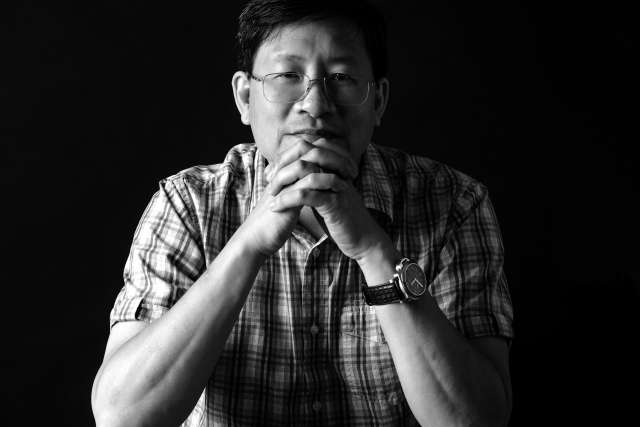Since the onset of the COVID-19 crisis, Otto O. Yang, MD, has been among the most sought-after experts to talk about the pandemic and its implications for the future — his name has ap - peared more than 4,300 times since March 2020 in stories from news outlets in North America and Europe. Over the course of his more than 20 years at UCLA, he has focused his attention on HIV and the pursuit of immune therapies and vaccines against the disease, as well as other viral infections. So, when COVID-19 struck, he was well positioned to shift his attention to this new virus. “We jumped into the field early, when the pandemic first hit, and we published some of the very first data showing that antibodies against the virus tend to persist for only a short time after somebody has been infected,” he says. “We now are extend - ing that work to look at antibodies in people who have gotten vaccinated.” Dr. Yang spoke with UCLA Health senior media relations officer Enrique Rivero in July, as the Delta variant was generating a resurgence of infections, hospitalizations and deaths throughout the country, about what is happening now with COVID-19 and what we may expect in the future.
In an issue over the summer of The Atlantic magazine, a writer made the statement: “We spent months building up shields against the virus, and we still don’t know how long we can expect that protection to last.” Should we be concerned about vaccine failure?
Dr. Otto Yang: We can look to what’s happened in Israel as a gauge for what’s probably going to happen elsewhere. They were the first country to really get a very high vaccination rate. And what they’re seeing now is that as the virus has continued to mutate, they are seeing more and more cases of infection. I take that as a sign that the antibodies are starting to fail; they don’t work as well against a variant as they do against the original sequence that was in the vaccine. As the virus continues to mutate, it will become more infectious, because that is a property that is selected for the advantage of the virus, and it will become more resistant to immune responses — especially to antibodies that were directed against the first sequence. And, so, I think that that means that we can expect to see more and more vaccine failures, as they are seeing in Israel. Fortunately, our T cells, which is a different part of our immune response, are less affected, so people who are vaccinated probably will still be protected from serious illness or death.

Can we gauge its potential to become more virulent?
Dr. Yang: The ability of the virus to spread and its ability to cause illness and death are not necessarily linked to each other. And, in fact, with natural selection, what we would expect is that the virus will, hopefully, over time become less virulent because the best outcome for the virus is to spread easily but not kill its host. If it kills its host, it is killing its only source of a home, of survival. That is not to say that there may not be variants that are deadlier, but those would be evolutionary accidents and not a selected property of the virus.
What concerns you most about the variants, and how do we address that issue?
Dr. Yang: The most concerning thing about the variants, like Delta, is that they will bypass the ability of vaccines to stop the spread of the virus. That means that the virus will be free to spread through the population, and that even if vaccines prevent healthy, vaccinated people from getting severely ill, there’s going to be a large population of people in whom the vaccines don’t work or who haven’t gotten vaccinated, and they will remain at very high risk for getting severely ill and dying. While we may not see the same massive waves that we did before vaccines were available, I think we’re going to continue to see an increase in deaths and severe illnesses in the hospitals.
If someone had COVID-19 and recovered, do they need the two doses of Moderna or Pfizer? Will they need a booster?
Dr. Yang: When someone first encounters something foreign, like a new virus, the immune system takes some time to gear up to make a response. Over time, once the person recovers, that response becomes what’s called a memory immune response — the cells that produced antibodies or reacted against the virus now are built up in the body, and they are ready to go, ready to be activated quickly if the body is re-exposed. With COVID-19, it’s clear that a person who has been infected will have these memory responses, and they will have some protection for some amount of time. But lots of research, including ours at UCLA, shows that the immune responses start to go down over time and will probably reach the point that a person will be susceptible to getting infected again. So, yes, it remains important for people to get vaccinated. In terms of whether or not a person needs one or two doses of these vaccines, some recent data that we published — which agrees with data from other groups, as well — shows that a person probably only needs one shot instead of two for these two-shot vaccine regimens. But it also is clear that the immune responses against this virus, for whatever reason, don’t last that long. And that’s, perhaps, not surprising because that’s a property of other coronaviruses as well.
Is it okay to mix different COVID-19 vaccines?
Dr. Yang: Scientifically, there’s no reason that there should be a disadvantage to mixing the vaccines, and there are potential positives from it. The two mRNA vaccines that currently are in use in the U.S., Pfizer and Moderna, are extremely similar in their design, so they’re probably, for the most part, interchangeable. The other vaccines — Johnson & Johnson, which is available in the United States, and AstraZeneca, which is not — are of a different type. They are adenovirus vaccines, and they are less potent than the mRNA vaccines. Because they are less potent, there may be an advantage to boosting those vaccines with one of the mRNA vaccines. Some countries are already doing this quite a bit.
How might the lessons learned from the creation of several COVID-19 vaccines in an impressively short timeframe inform future vaccine development?
Dr. Yang: While the process for getting a vaccine from the lab into the arms of people was remarkably quick, it is important to point out that the development of these vaccines was not quick. mRNA vaccines have been in testing for more than 20 years. These are what are called “platform vaccines.” That is a vaccine concept that’s based on a platform that can be modified to deliver whatever you want. This is very different than prior vaccines. The mRNA vaccines contain the insertion of a gene of interest, in this case the spike protein from this virus, and so any protein from another virus that you want to target could be quickly shuttled in. It would be very quick to also use the same platform to make a vaccine against the variants. So, I think that the lessons learned are that this long-term investment in science and in developing these platforms has proven to be hugely beneficial, and this kind of investment should continue. We need to think long-term about these potential threats to our health and about strategies to invest in research that may have implications that we don’t necessarily immediately foresee.
What lessons are to be learned from the fact that highly effective vaccines are encountering resistance — and in some cases hostile resistance — among a portion of the population?
Dr. Yang: I think if you had asked me in 2019 what would happen to our society if a massive pandemic hit and people started dying, my prediction would have been that trust in scientists and physicians would markedly ramp up. I would have thought that would be especially true with successes we have had with the vaccines and our greater knowledge about how to effectively treat this disease. I would have predicted that people would have looked at these things and that confidence and trust in science and medicine would increase, and that political divisions would have been set aside because everyone would be united against a common enemy. And, of course, I would have been completely wrong. This, to me, is a really crazy paradox, and I can’t explain it. It is a mystery to me how we can have these successes and, yet, so many people can disbelieve even that this is a serious illness and not have faith in the vaccines. Obviously, this points to deeper societal problems that are way above my pay grade. It is completely baffling to me.
From the experience of this pandemic, what concerns you most?
Dr. Yang: It really concerns me that something like this was able to spread so quickly. It seems like yesterday that there were these initial reports of this strange SARS-like infection in Wuhan, China, and that in just about three or four months, it was a worldwide pandemic. And the fact that something like that can happen so quickly because our world is so connected now is really concerning; it can happen again. And also it is very concerning to see the extreme disorganization of the public responses and government responses to the virus, and to see the massive failures and loss of life that have occurred as a result. In this country, we had at least three months of advanced warning before the virus hit our shores, and yet, we were not prepared. We did not take care of simple things like mask manufacturing and distribution, public policies about distancing, even policies about simply wearing masks. We just did not have our act together. It’s really concerning that this happened this way, and it’s also really concerning that we don’t seem to be learning lessons, and it seems like it could happen again.
Even so, what gives you hope?
Dr. Yang: The demonstrated successes we’ve had with the platform vaccines that can be rapidly retooled and deployed for another virus, if it hits. As fast as it was to bring these vaccines out, I hope that it can be even faster next time. It also gives me hope that there are a lot of people in the public who have taken this very seriously, and that there may be some behaviors that become fairly routine, like masking, especially during the winter months. Another thing that gives me hope is that there has been a clear interest in infectious diseases and in infectious-disease research. I’ve personally been touched by quite a few donors who have donated to my research program, and that is completely new. In my previous 20 years at UCLA, I’ve had only one person who thought to give a donation to my research program. But now, many more people have been donating because they recognize the importance of what we are doing. These things are the silver linings within the cloud.

